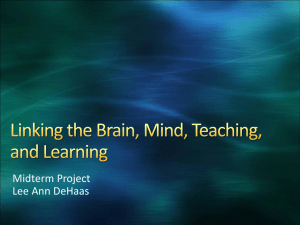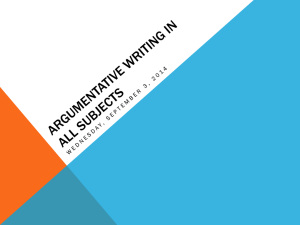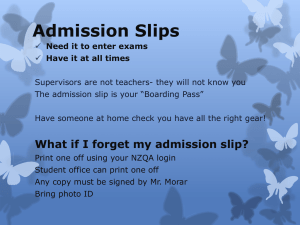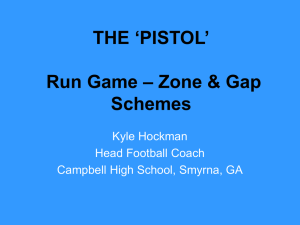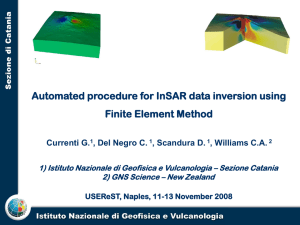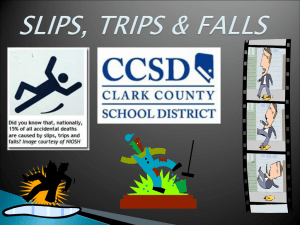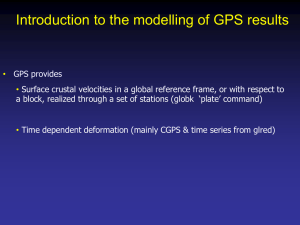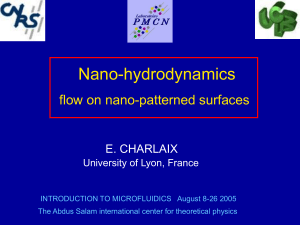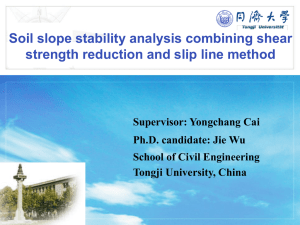Freymueller
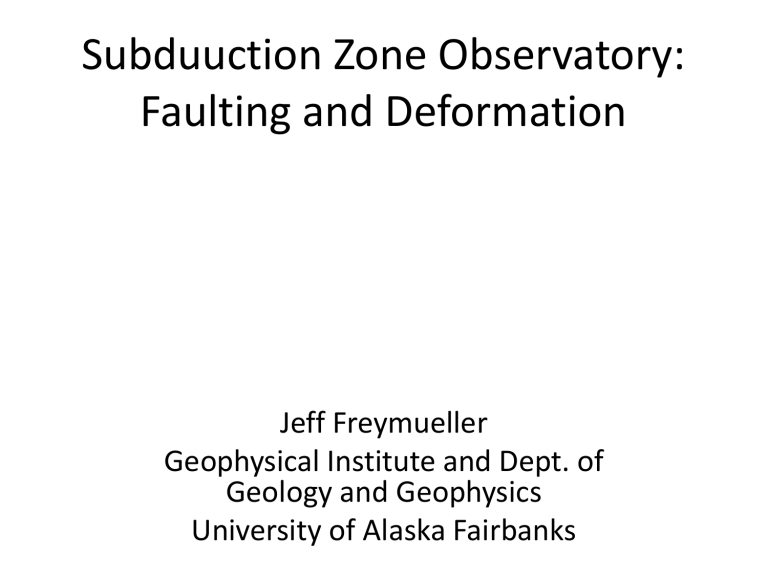
Subduuction Zone Observatory:
Faulting and Deformation
Jeff Freymueller
Geophysical Institute and Dept. of
Geology and Geophysics
University of Alaska Fairbanks
Along-Strike Variations are Nearly Ubiquitous
Freymueller et al. (2008)
Q– What controls along-strike and downdip variations in the extent of slip?
Hikurangi Spatial/Temporal Variation
McCaffrey et al. (2008, Nature Geosciences)
Estimated Plate Coupling
from GPS data 1995-2000
Meade and Loveless (2010)
Estimated Plate Coupling
from GPS data 1995-2000
Slow Slip Events
Meade and Loveless (2010)
Estimated Plate Coupling
from GPS data 1995-2000
Slow Slip Events Afterslip from 1994 quake
Meade and Loveless (2010)
Estimated Plate Coupling
from GPS data 1995-2000
Slow Slip Events Afterslip from 1994 quake
Meade and Loveless (2010)
Comparison of Locked Zone to Slip
• Colors: Loveless and
Meade (2010) interseismic model
• Contours: Jack Loveless’ slip model contours
• To first order, the rupture area of the earthquake is the same as the interseismic locked zone
Loveless and Meade, 3/14/11
Loveless and Meade (2011)
relative plate motion
Trench
Along-Strike Variation
Along-Strike Variations are Nearly Ubiquitous
Freymueller et al. (2008)
Q– What controls along-strike and downdip variations in the extent of slip?
Slip Spectrum I: Seismogenic Zone Slip Modes
• What do we want to know for understanding the slip modes?
– Locked or creeping interface?
– Need better constraints on depth, thickness and properties of plate interface and properties of slab.
– Are there earthquakes at the updip/downdip end? What is the slip behavior?
– Detailed distribution of earthquakes. On interface or not?
– Structural controls/influences?
• Time dependence of above properties?
• Outcomes controlled by interface properties or surrounding medium?
Slip Spectrum II: Slow Slip
• Where is there slow slip on a subduction thrust?
– Tremor is one marker of slow slip, but there can be slow slip without tremor (why?)
– Small migrating earthquakes can be an indication of slow slip?
– What conditions are necessary for tremor genesis?
• Dewatering? Chattering of slip?
• Space/time distribution of tremor?
– Alaska tremor patchy, are there special locations/conditions?
– Japan has examples of both patchy and continuous
• Sustained or episodic?
• Spectrum of Duration/Size?
– One >9 (12?) year event now identified (Li et al., S53C-4511)
Some Complications We Think We
Understand (sort of)
• Postseismic deformation
– Afterslip (on the plate interface)
– Viscoelastic relaxation (in mantle wedge)
• Along-strike variations
– Extent of slip deficit varies along strike: why?
• Slow slip events
– The locked to creeping transition is dynamic
• Common theme: slip along interface varies with time – not just interseismic + coseismic.
Q– Why are the amounts of afterslip and viscoelastic relaxation so variable?
Earthquake
1960 Chile (M9.5)
Afterslip
??
Viscoelastic Relaxation
Large, lasted for decades
1964 Alaska (M9.3)
2004 Sumatra-Andaman
(M9.2)
2005 Sumatra (M8.7)
~6 meters (25-30% of coseismic), decades
Large, lasting > several years
Large, lasted for decades
Large, lasting > several years
Large, both updip and downdip
Clearly present in far-field data
1995 Antofagasta (M8.1) Small, gone within ~3 years None?
2007 Kurils (M 8.1)
1994 Sanriku (M 7.7)
Ended within 0.5 year
Equal to coseismic
Large, will last ~ decade minimal
We have not been successful in making advance predictions of postseismic deformation following large or great earthquakes.
Deformation of Upper Plate
• Deformation of upper plate is complex, and highly varied along the Americas
– Broad zones of diffuse deformation
– Slip partitioning of oblique subduction and motion of forearc slivers
– Back-arc convergence, fold&thrust and basement
• Linked to subduction, but need to fully measure stress state and strain field.
Motion of Overriding Plate
What is the Arc velocity?
Cross and Freymueller (2008)
SW arc translation of 4 mm/yr
Updip limit is poorly constrained by land-based data
But, moment rate deficit is well constrained
Upper Plate Slivers are Common
Nocquet et al. (2014, ngeo)
Measurement Needs
• Geodesy and Deformation
– Measurements of long-term and short term steady deformation and transients
– Response to loads, earthquakes reveals rheology
• Seismology
– Seismicity
– Source
– Structure (velocity, anisotropy, attenuation)
• Integration
